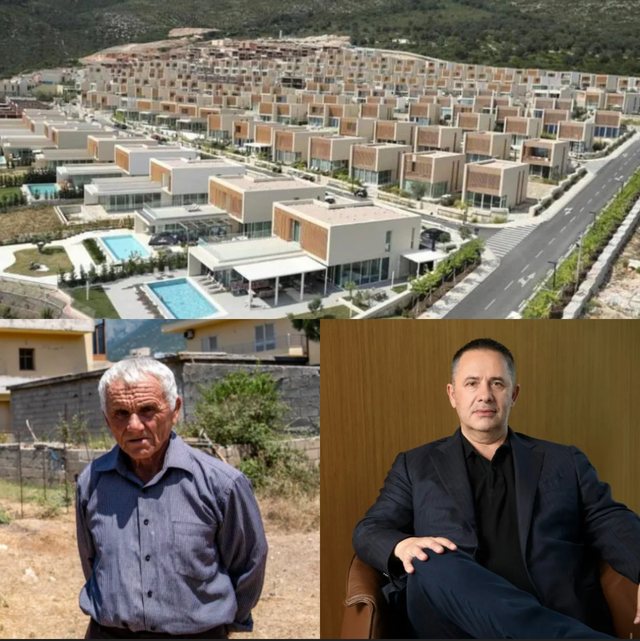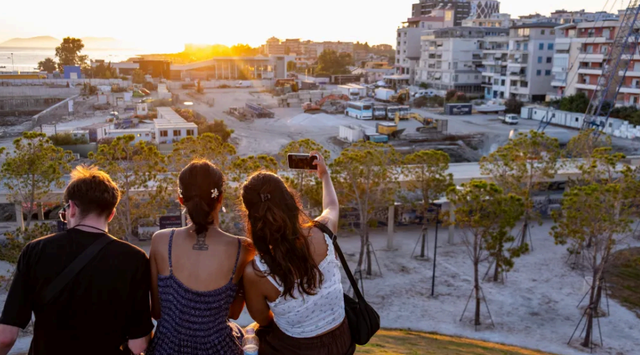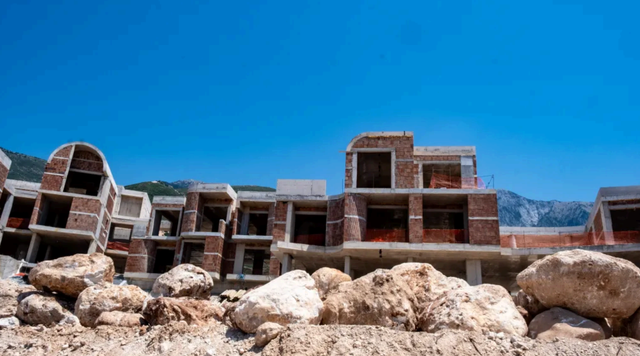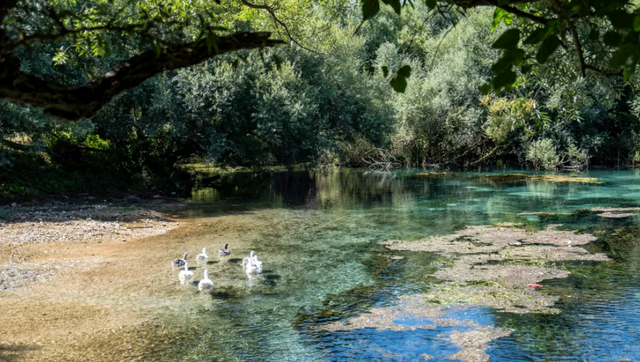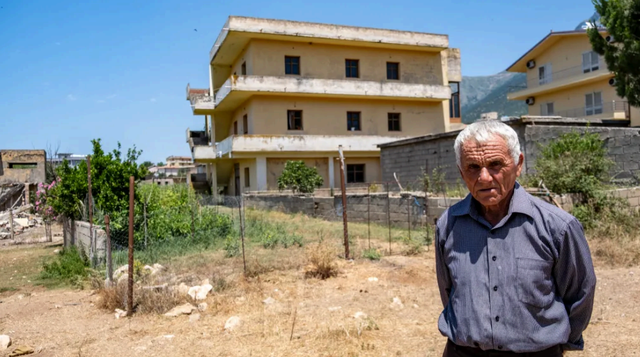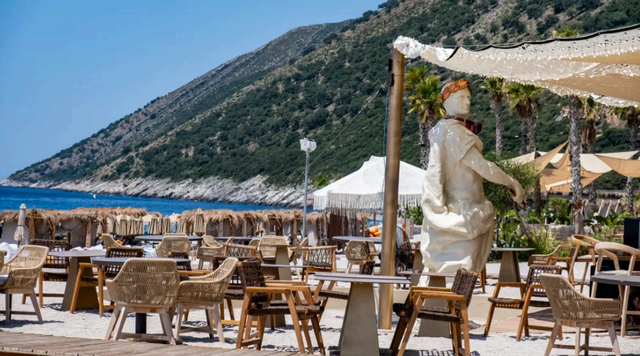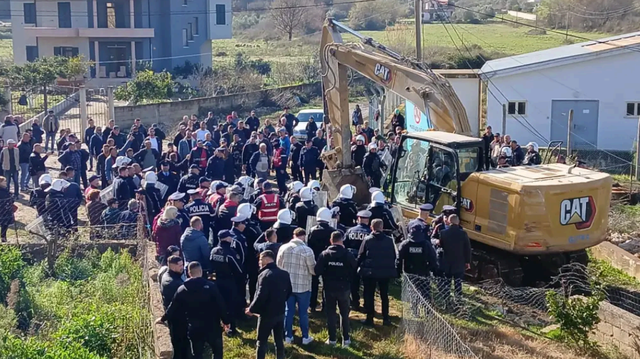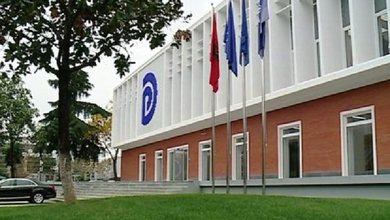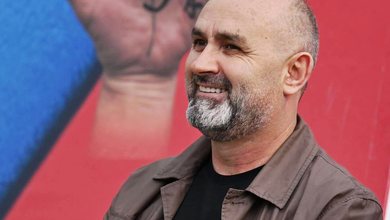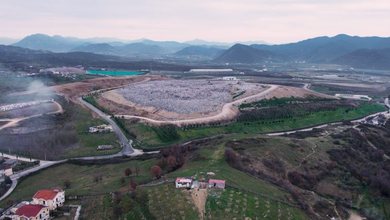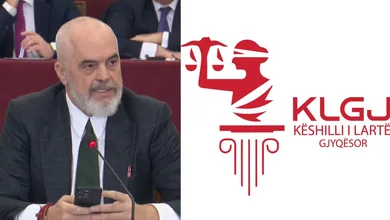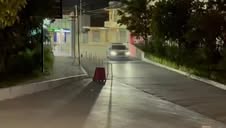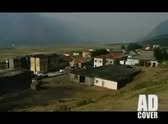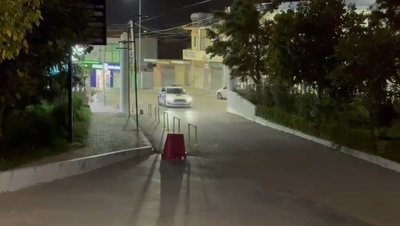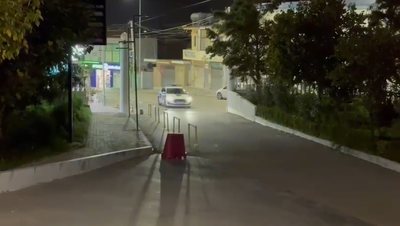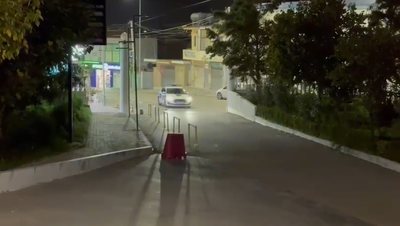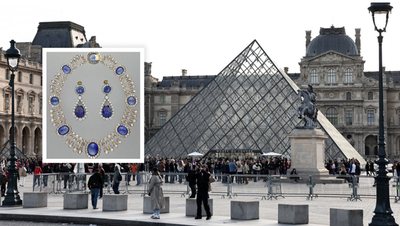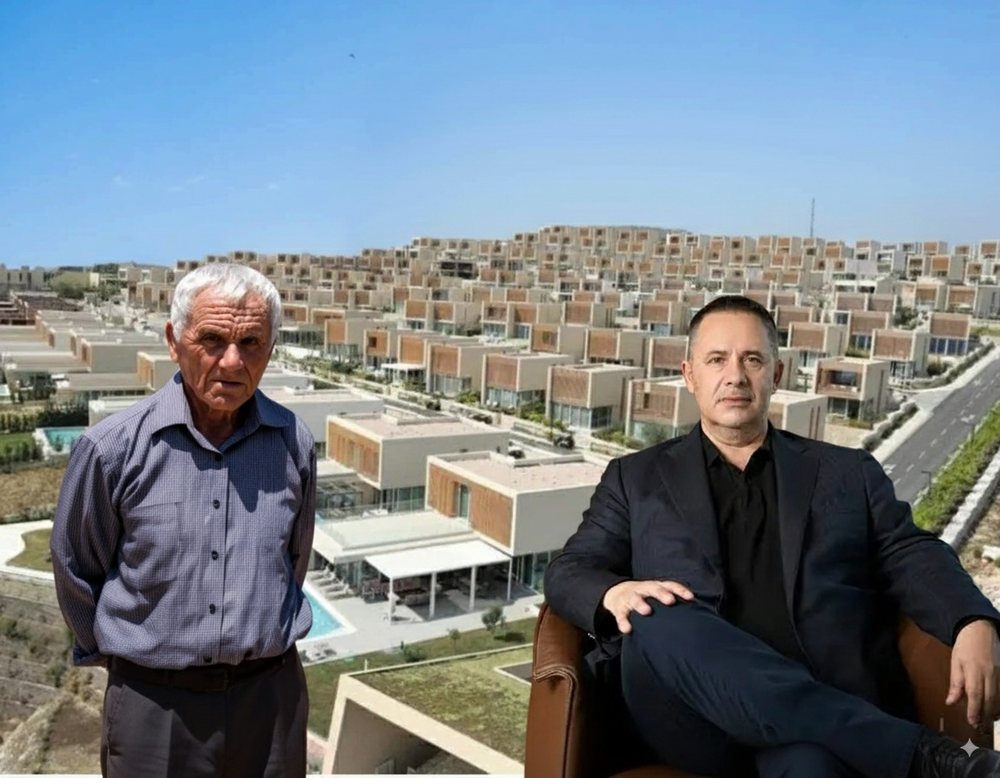
Developers are rushing to build luxury resorts. But locals fear their way of life is at risk — and anger is erupting over the "strong-arm" tactics.
The retired policeman flexed his biceps and smiled.
“See those rocks?” said Hyso Xhuveli, 75, pointing to the many sharp objects lying around the dirt road, ready to be thrown. “We’ll do that if they come back.”
Xhuveli didn't look like he was kidding. A few months ago, he helped drive away an excavator sent to Tragjas — a village in southern Albania — on behalf of the country's richest man, to tear up the land we were standing on.
The Caterpillar driver had arrived to start work on a pipe that would bring water from the local spring to Green Coast, a multi-billion-euro resort complex being built by Samir Mane, a home appliances tycoon, 15 miles along the Adriatic coast.
Protesters trying to drive away the excavator in Tragjas
The spring has fed the village since the time of the Illyrians, neighbors of the ancient Greeks. It supplies a crystal-clear village pond and nourishes wildflowers, wheat fields, and the lush green grass where cows and sheep graze.
Work on the Green Coast began four years ago, and two of the four planned sections are now open. When completed, it will cover 90 hectares and contain luxury villas and seven five-star hotels, as well as restaurants, private beaches, police and ambulance stations and a helipad. It is Albania’s largest tourist development since the country opened to foreigners after the fall of the communist dictatorship in 1990.
His obstacle is a revolt. In March, Xhuveli and several hundred other men and women from Tragjas surrounded the excavator, fighting with about 50 police officers until they retreated into the hills. Not a single inch of soil was touched.
The spring at Tragjas has fed the village for around 2,000 years.
The village is one of over 30 communities that have protested against a pipeline network intended to serve the Green Coast and other nearby resorts that together will occupy an area half the size of Greater London.
The villagers fear the pipes will leave them without enough water to live on the land. After a long history of confrontation with occupiers, including as partisans who fought alongside British liaison officers against the Germans during World War II, they are not easily intimidated.
“Mark my word, there will be blood if this continues…” said Mezin Ramohitoj, the village head, who is a bricklayer. “There is still room in the village war memorial.”
For much of the second half of the 20th century, Albania was a poor communist state, isolated by things like the holiday resorts of dictator Enver Hoxha. With nuclear bunkers and mountain prisons for dissidents, the country was the North Korea of Europe. Now TikTok and Instagram users call it “the Maldives of Europe” or “the Thailand of Europe.”
• How this surprise destination became Europe's most affordable luxury getaway
Travel agents see a new Mediterranean gold mine, with white beaches and blue waters as alluring as those in Greece, Italy or Croatia. Albania now ranks as the fastest-growing tourist destination in Europe, with 11.7 million visitors recorded by the government last year — although the figure may have been inflated by the influx of Turkish oil workers and Albanian diaspora counted every time they enter.
The city of Vlora has changed rapidly. There is no doubt, however, about the large number of hotels and tourist developments that are popping up along the Adriatic and Ionian coasts at a rapid pace, especially between the southern city of Vlora and the city of Saranda, a stretch touted as the Albanian Riviera. In the 2000s, Saranda had two hotels: now there are 600.
One in five of the three million Albanians work in tourism, while Filipinos and South Asians are increasingly coming as cleaners and waiters. This summer Ryanair and other airlines operated 44 weekly flights from Britain to Tirana, the capital. The government is building an airport in Vlora, with plans for direct flights from as far away as the United States.
Donald Trump's family is also interested in a piece of the action. The US president's daughter, Ivanka, and her husband, Jared Kushner, have announced plans to build a $1.4 billion hotel on Sazan, an uninhabited former military island covered in bunkers, opposite Vlora.
Many of these projects are controversial. Activists accuse the government of Edi Rama, the colorful prime minister, of giving away land at low prices to favored investors regardless of the environmental impact.
Criticism focuses particularly on a strategic investment law introduced by Rama in 2015, two years after he took office, that allows investors to take land from the government for just 1 euro, with the state then legally obligated to provide access to water, a power grid and roads. (The government has built a road tunnel through the mountain to the Green Coast.) Meanwhile, the law gives investors protection from land claims.
Up and down the coast, people say they have been offered huge sums of money by developers for their homes, feeling they have no choice but to accept. In a 2021 report, the group Civic Resistance argued that the law serves “as a form of ‘pressure’ on [private property] owners, who are forced to accept a deal with investors, because otherwise the state will step in to expropriate their properties at a value that may be below market value.”
There are thousands of disputed ownership cases in Albania, dating back to the collectivization of land under the communist regime.
Mane, a respected figure whom Forbes magazine this year listed as having a fortune of $1.5 billion, insists that all the land for Green Coast — purchased for an undisclosed sum thought to have been significantly more than 1 euro — was acquired in a proper manner.
Green Coast has a statue of Julius Caesar, who landed in southern Albania on his way to Macedonia.
Balfin Group, his real estate company, also denies allegations that it failed to consult or compensate residents of a poor neighborhood in Vlora that was demolished for a marina.
But I heard a different story when I visited and met a man who said he had lived for 35 years with his wife in a bungalow near what is now the marina. The man, too anxious to give his name, said the main entrance to his house had been demolished seven months ago to make way for the marina.
“In Britain you have laws. Here it’s just the law of the fittest,” he said, claiming he was not warned about the planned works or compensated. Balfin Group did not respond to a request for comment on the case.
Albania has long been identified as a hotbed of money laundering, and the tourism boom has only added to this, investigators say. “Hotels and restaurants have always had close links to the criminal world and have been used for money laundering activities,” the Global Initiative Against Transnational Organized Crime reported last month. “However, the industry’s ever-increasing profitability has attracted significant investment from illicit sources.”
The Albanian criminal mafia makes money from drug and human trafficking, as well as smuggling migrants and weapons. Many construction companies are suspected of being fronts. There is no evidence that Mane, who went from selling refrigerators and dishwashers to owning shopping malls, a bank and many real estate ventures in America and Canada, is involved in criminality, however.
In Albania, it is difficult to know exactly who is with whom. Local investigative journalists describe the country's politics as a blood sport played between elite families, with accusations of corruption as the weapon of choice.
Ish-kryebashkiaku i Tiranës, Erion Veliaj, i konsideruar një protezhe i Ramës, është në burg duke u përballur me akuza për kanalizim të kontratave publike te shokët, si edhe për shpenzime prej qindra mijëra eurosh për bizhuteri e rroba për gruan e tij. Veliaj thotë se prokurorët e tij kanë “ndërtuar çështjen mbi … pretendime të pabaza për të skicuar një thriller në stilin e Sherifit të Perëndimit të Egër.”
Prokurori i Sarandës u pezullua në janar nën akuza për marrje ryshfeti, të cilat ai i mohon. Paraardhësi i tij është në burg për të njëjtën arsye, pasi u lirua në 2023 dhe u burgos përsëri në qershor.
Një humbës i qartë nga bum-i turistik është mjedisi. Nika, një biolog me profesion, tha se 70 për qind e investimeve strategjike në turizëm janë në zona natyrore të mbrojtura me ligj, të cilat qeveria mund t’i japë pa pasur nevojë të kompensojë vendasit. Green Coast, që ndodhet në buzë të Parkut Kombëtar Vjosë, do të marrë ujë nga një lumë atje që është shtëpi e 13 specieve globalisht të kërcënuara, përfshirë bretkosa, peshq e zogj.
Kompania Green Coast këmbëngul se nuk ka probleme me ujin dhe se ka mjaftueshëm në zonë si për vendasit ashtu edhe për pishinat dhe lëndinat e resortit. Fshatarët pretendojnë se po përdoren matje të vjetra për sasinë e ujit që buron, e cila sipas tyre po pakësohet për shkak të ndryshimeve klimatike.
Muajin e kaluar, këngëtarja shqiptare Ledina Çelo ndau me një milion ndjekësit e saj në Instagram një video që dukej se tregonte një rubinet që nuk nxirrte më ujë në vilën e saj në resort.
Myzafer Xhuveli është i shqetësuar se do të humbasë shtëpinë dhe jetesën si bari
Myzafer Xhuveli, 80 vjeç, një bari nga Tragjasi me një fytyrë të rrudhur dhe një thua të gishtit të madh të dorës së shqyer nga shtrati (“një dëmtim i vjetër”), tha se kishte qenë i detyruar të pakësonte numrin e deleve nga 1,000 sepse ka më pak ujë se më parë. Ai jeton pikërisht aty ku është planifikuar tubi.
“Ata duan të shembin shtëpinë time,” tha ai.
Ramohitoj, kryetari i fshatit, është gjithashtu i shqetësuar. Nëse vendoset tubi, “pusi i fshatit do të thahet, temperatura do të rritet, arat do të thahen … njerëzit do të largohen prej këtu sepse do të bëhet një vend i vdekur,” frikësohet ai.
“… Ende ka vend në memorialin e luftës së fshatit.”
Në Kallarat, një tjetër fshat aty pranë, banorët e armatosur me shkopinj, kosore dhe thika bllokuan një makinë që sipas tyre transportonte materiale ndërtimi për një tubacion. Ata e përmbysën automjetin në rrugë, e lanë të shkatërruar dhe drejtuesi i tij u shpëtua vetëm kur policia ndërhyri.
Për të mbajtur rendin në rajonin e mbushur me pushime luksoze, qeveria e Tiranës ka dislokuar njësi speciale policie dhe të blinduar. Në Vlorë, qyteti më i madh i zonës, policia shpërndau me gaz lotsjellës një protestë që kërkonte ndalimin e punimeve.
“Qeveria jonë është përkrah tayconns" tha Xhuveli. “Nuk kemi ku të mbështetemi, përveç tek vetja jonë.”
He and others compared the battle to a similar conflict in 1997, when the collapse of a financial pyramid scheme plunged Albania into chaos. Villagers seized weapons from military depots and set up barricades against the police and army.
Just as then, the country is at a turning point. The economy has grown rapidly since Albania became a candidate for the European Union a decade ago, and this is reflected in its Riviera. Hospitality has become a multi-billion-euro industry. The beaches of Dhërmi, Himara and Jala, once frequented only by locals, are now dotted with Italian yachts and private jets bringing tourists from Europe and beyond.
For Mane, who made his fortune with the Neptun chain of stores, this is a golden opportunity to put Albania on the map of Mediterranean luxury tourism. He has received strong support from Prime Minister Edi Rama, who sees the development as a means to attract capital and bring the country closer to the EU.
But many ordinary Albanians don’t feel part of this vision. In Tragjas, residents say they are not against tourism, but against the fact that it is destroying their traditional way of life. “We don’t want to become servants in their hotels,” Ramohitoj said. “We want to live as we have always lived — working our own land and drinking our own water.”
Amid this conflict, Mane representatives have promised that the villages' traditional resources will not be affected and that the pipelines will be managed carefully. But trust is broken.
In Tragjas Square, young people look with distrust at every passing foreign car. Older men hold bitter memories of previous invasions — Italian, German, Greek, Turkish. Now they feel they are facing a new invasion: that of money and luxury.
“We are ready to die for this water,” said Xhuveli, pointing again to the village spring. “Without it, we are nothing. They should know that.”


